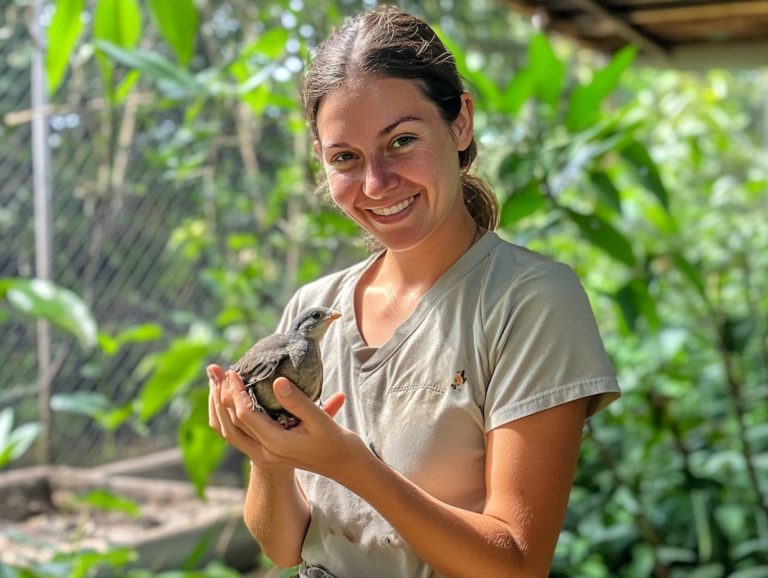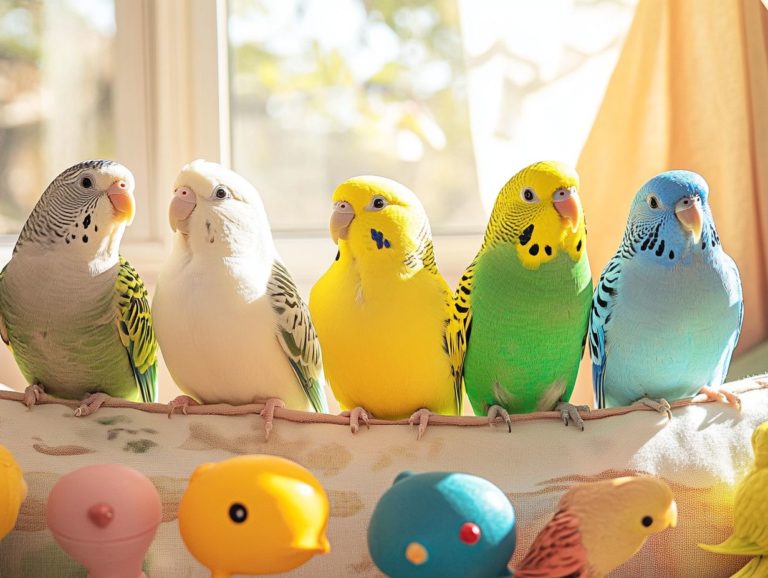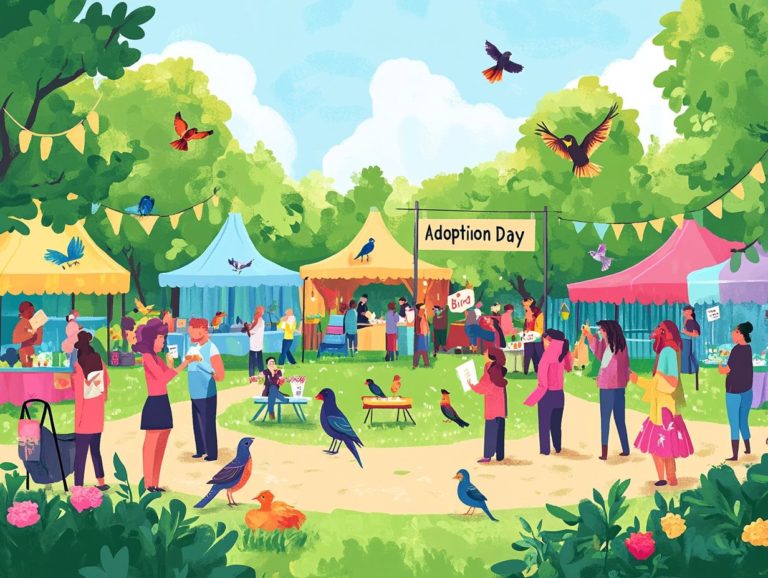The Emotional Journey of Bird Adoption
Adopting a bird can be a heartwarming yet intricate journey filled with excitement, a touch of anxiety, and strong emotional bonds.
Whether you’re considering bringing a feathered friend into your life for companionship or as a vibrant addition to your home, it’s crucial to think about the changes to your routine and the potential behavioral challenges you might face.
This article explores the emotional impact of bird adoption, highlighting both the challenges and the rewards of nurturing a bond with your new pet.
Prepare to discover valuable tips for transforming your home into a welcoming haven for your avian companion!
Contents
- Key Takeaways:
- The Decision to Adopt a Bird
- The Emotional Impact of Adopting a Bird
- The Challenges of Bird Adoption
- The Rewards of Bird Adoption
- Tips for a Successful Bird Adoption
- Frequently Asked Questions
- What are the emotions involved in bird adoption?
- How can I prepare emotionally for bird adoption?
- What should I consider before adopting a bird?
- How can I cope with the challenges of bird adoption?
- What emotions may arise during the adjustment period after bird adoption?
- How can I ensure a smooth emotional journey for both myself and my new bird?
Key Takeaways:
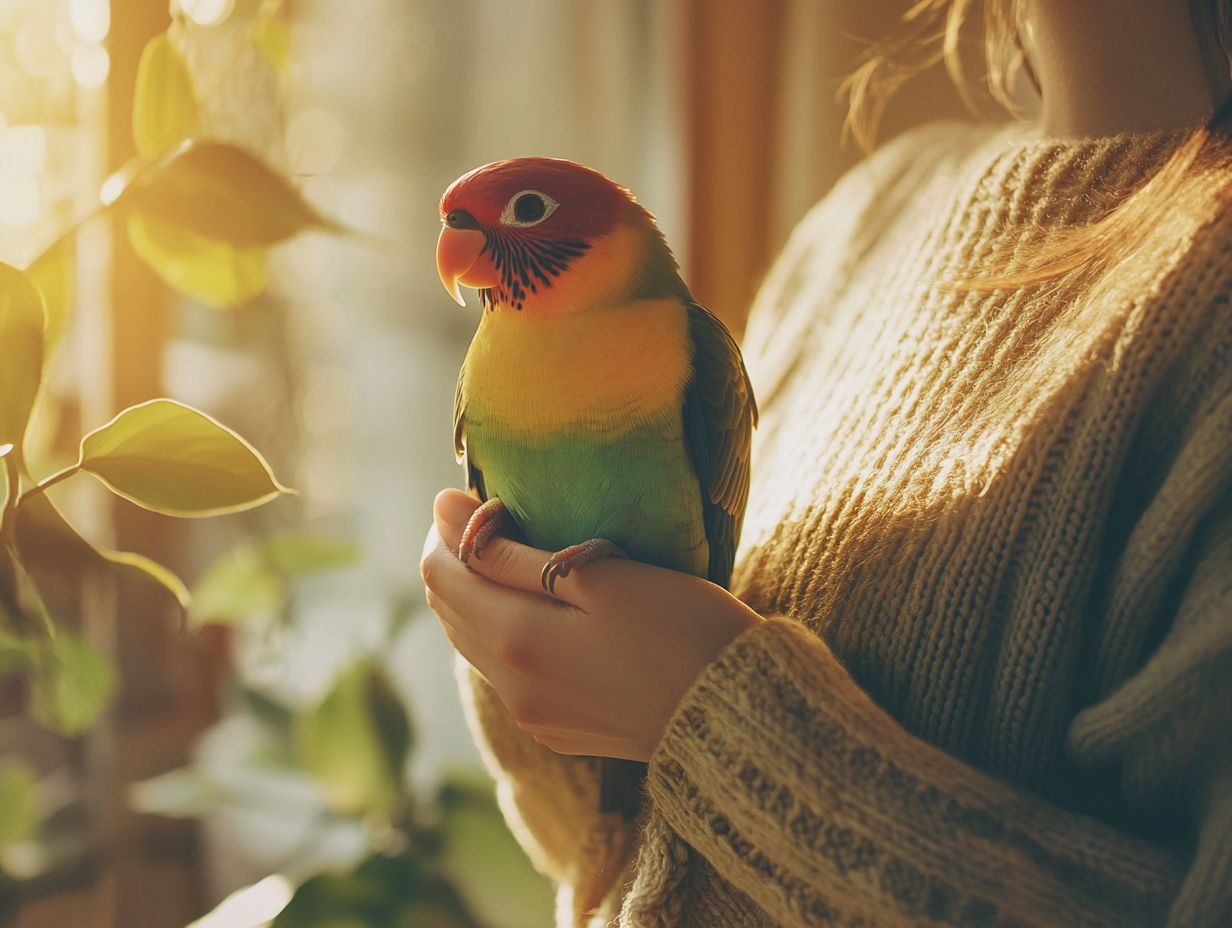
- 1. Before adopting, think about the long-term commitment and care involved. Understanding the potential for emotional trauma in rescued birds is crucial.
- 2. The emotional journey of adoption includes both excitement and anxiety, ultimately leading to a strong bond with your new feathered friend.
- 3. Addressing challenges like adjusting to a new routine and behavioral issues can make the adoption process more rewarding.
The Decision to Adopt a Bird
Choosing to adopt a bird is a significant decision that requires thoughtful consideration of several key factors. You should consider the emotional history that a bird may carry and the financial responsibilities that come with pet ownership.
As you weigh this choice, it’s vital to appreciate the deep social bonds birds form with their families, including the unique connections that parrots develop within their flock. Adopting from an avian sanctuary offers a parrot a fresh start and the chance for companionship and healing. This journey can be incredibly exciting and fulfilling!
Factors to Consider
When considering bird adoption, several critical factors come into play. The type of bird species you’re contemplating and their care requirements will significantly influence the emotional connection you develop.
Every bird species has its own personality. Knowing their needs can lead to a loving relationship. For example, the chatty and social budgerigar and the more independent cockatiel each require different care routines. A well-cared-for bird is likely to respond with warmth, while one that feels neglected may show signs of distress.
Health issues like allergies or other personal conditions can impact your ability to provide the ideal environment. Training is also essential; by engaging regularly with your bird, especially with species like the Moluccan Cockatoo and Amazon parrots, you can cultivate a deep emotional bond. It’s crucial to address their specific traits while navigating any care challenges that may arise.
The Emotional Impact of Adopting a Bird
The emotional impact of bird adoption can be truly profound. It opens a channel for companionship and requires understanding the lifecycle of adopted birds and the emotional trauma your feathered friend may have endured, especially if they are from a parrot rescue or an avian sanctuary.
This understanding fosters a unique and meaningful bond between you and your bird, enriching both your lives in ways you might not expect.
Excitement and Anxiety
Adopting a bird brings a delightful mix of excitement and apprehension. As a new bird owner, you may feel joy at welcoming a feathered companion but also concern about emotional attachment and the adjustment process. To make the most of this journey, consider exploring ways to celebrate Bird Adoption Month.
This journey can feel overwhelming, especially as you navigate your bird’s unique behaviors and needs. The initial period is crucial; both you and your bird are learning to communicate and build trust.
To ease your anxiety, educate yourself about your bird’s species-specific habits and quirks. Emphasizing patience is vital; forging a strong bond takes time, understanding, and consistent interaction. Celebrate small victories, like a cautious approach or a gentle chirp, as these moments help alleviate worries and strengthen your connection.
Attachment and Bonding
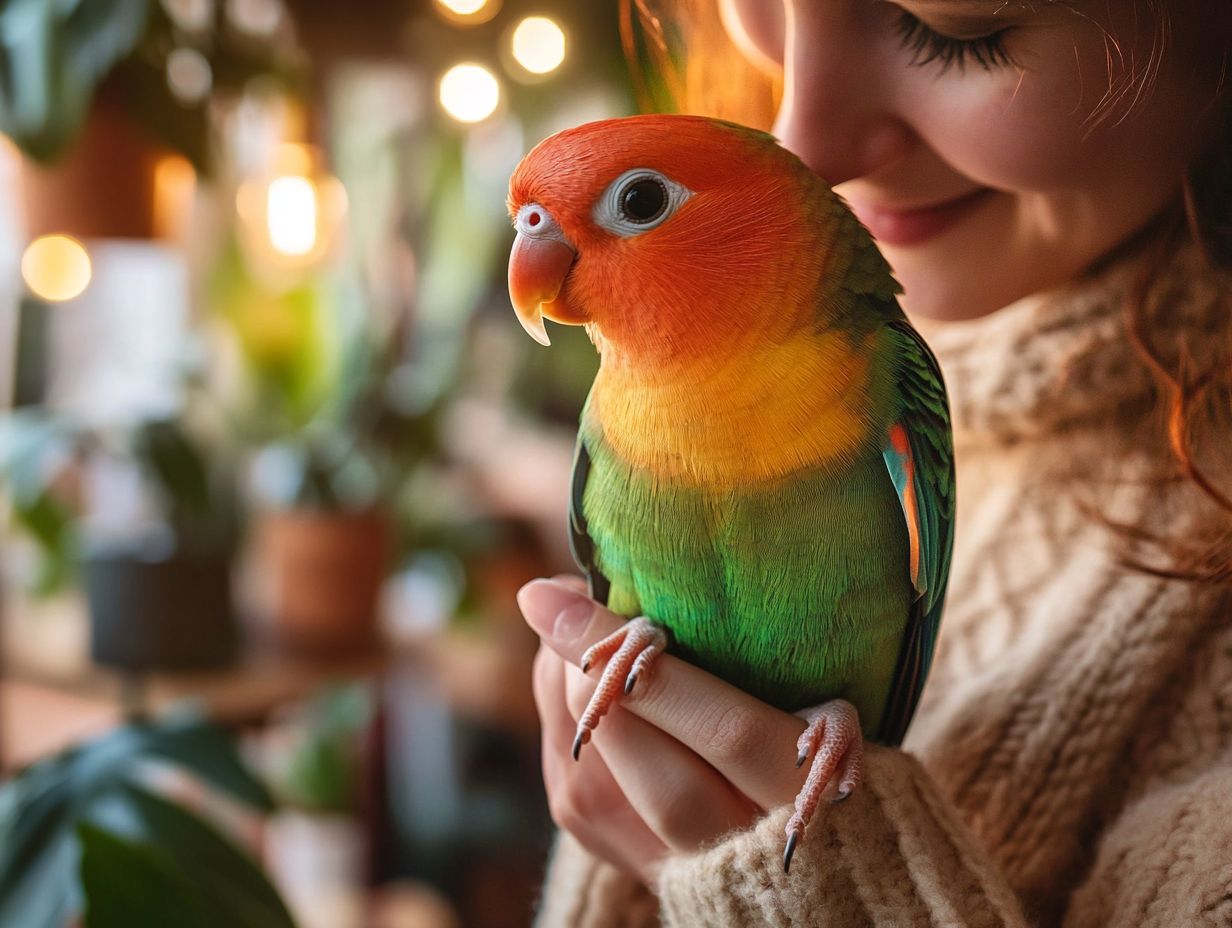
Building a bond with your bird is essential. It enriches your life and helps your feathered friend adjust to its new home.
This bond can significantly enhance your bird’s well-being. For families who have adopted birds from an animal rescue shelter, this connection encourages positive behaviors.
By paying attention to your bird’s body language and vocalizations, especially in species like Amazon parrots, you can gain valuable insights into its emotional state and preferences.
Establishing a consistent routine is key. Predictability can make your bird feel more secure, particularly for species like the Eclectus hen or Poicephalus.
Engaging in gentle interactions, like offering treats and playing together, fosters a loving atmosphere. This nurtures the vital connection needed for birds re-homed from various rescue stories.
Over time, you’ll craft a partnership built on trust and communication that truly flourishes.
The Challenges of Bird Adoption
Adopting a bird can be incredibly rewarding. Yet, it also brings challenges that you’ll need to navigate, especially when it comes to understanding the behavior of adopted birds.
During the adjustment period, you may encounter instances of aggressive behavior or signs of emotional distress in your new feathered companion. This is especially true if they come from a financial crisis situation requiring rehabilitation.
Adjusting to a New Routine
Adjusting to a new routine is vital for both you and your bird. It establishes stability and security in the new environment, which is critical for effective bird care.
By incorporating consistent feeding schedules, playtime, and training sessions into your daily routine, you foster a trusting bond with your feathered companion.
These structured interactions not only encourage healthy behavior but also provide the mental stimulation vital for your bird s well-being.
Social interaction is important too. It allows your bird to feel integrated into the household, reducing stress and anxiety during this adjustment phase.
A well-planned routine helps with your bird s adjustment, promoting a happier and healthier pet that thrives in its new surroundings.
Addressing Behavioral Issues
Addressing behavioral issues in birds, such as aggression, is essential for a successful adoption experience. This often involves specialized training and rehabilitation techniques tailored to each species’ unique needs.
Many newly adopted birds may display fear or nervousness, manifesting as biting or screaming to communicate their distress. Understanding their history, including any past emotional trauma, can offer valuable insights into these behaviors.
For instance, positive reinforcement training can foster trust and encourage desirable behaviors.
Creating a safe and enriching environment, like one found in a well-run animal rescue shelter, is crucial. It significantly reduces stress and instills a sense of security.
Regular interaction and socialization are vital components of rehabilitation too. This approach allows birds to adjust more comfortably to their new homes while minimizing the potential for aggression or anxiety-related issues.
The Rewards of Bird Adoption
The rewards of bird adoption far surpass the challenges you may encounter. This is especially true for families committed to caring for birds, as there are several important factors to consider, including what you should know about bird adoption.
Forming a bond with your feathered companion not only enriches your experience but also positively impacts your mental health and emotional well-being.
Bonding with Your Bird
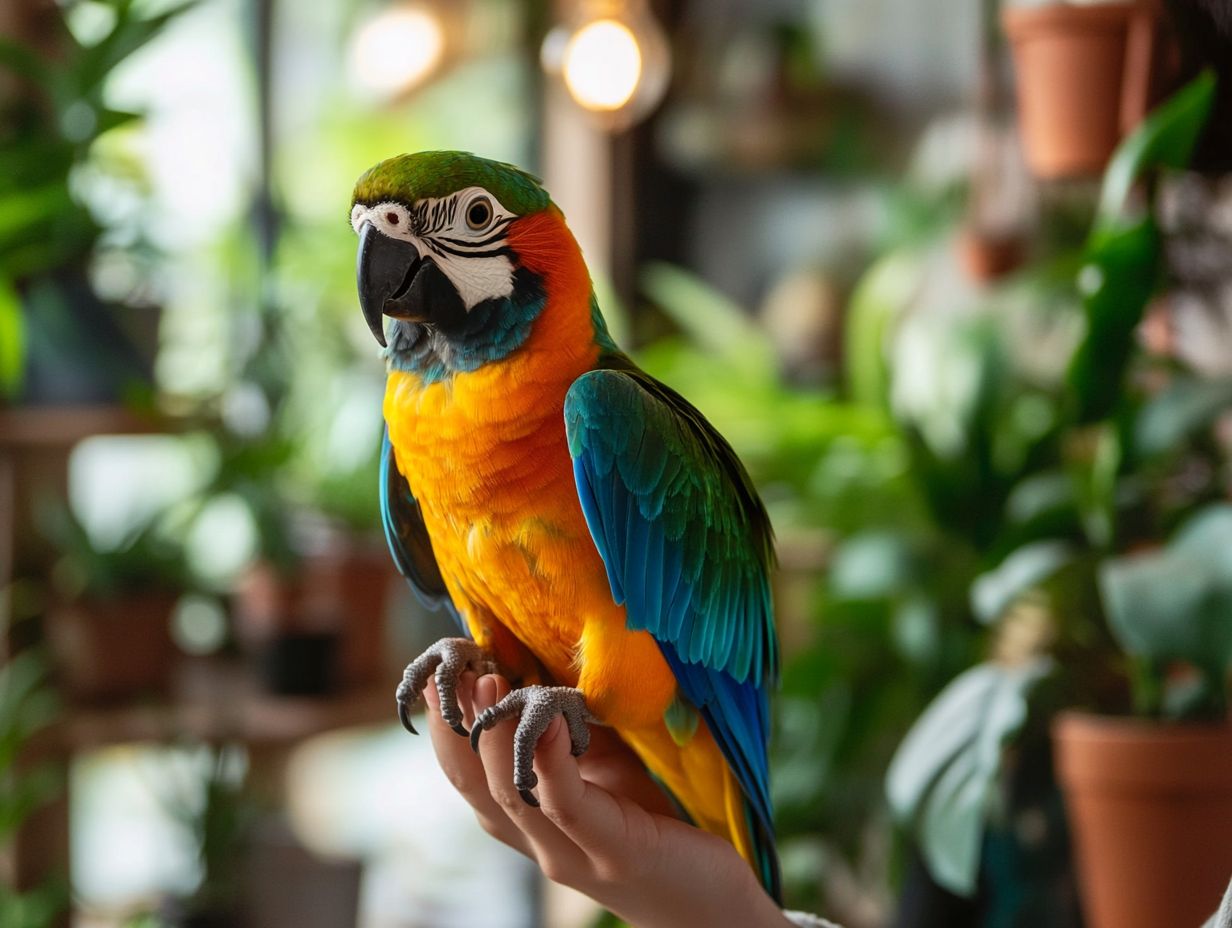
Bonding with your bird is an enriching experience that deepens social connections, especially for parrots, enhancing both your companionship and understanding of bird care.
By engaging in fun play activities and gentle training sessions, you can gradually build trust and communication with your feathered friend. Observing your bird s behaviors during these interactions offers valuable insights into its personality and preferences, allowing you to tailor your care approach effectively.
Incorporating socialization with other family members or even other birds, such as the chatty budgerigar or more social species like the Congo Grey Parrot, can significantly enhance your bird s well-being. Establishing a routine that includes quality time together will further strengthen this beautiful relationship, bringing joy and companionship for years to come.
Positive Impact on Mental Health
Bird adoption can have a fantastic impact on your mental health, particularly when considering stories of resilience from the Rhode Island Parrot Rescue and similar organizations. The companionship that a bird offers can significantly alleviate feelings of loneliness and foster deep emotional connections.
Engaging with these vibrant creatures not only brings joy but also presents therapeutic benefits that mental health professionals are increasingly recognizing. Their playful antics ranging from the vibrant colors of Hyacinth Macaws to the melodic songs of Amazon parrots provide daily delight, stimulating both your mind and spirit.
Observing their behaviors, like mimicking sounds or interacting playfully, can elevate your mood and spark moments of laughter. The responsibility of caring for a bird helps establish routines and structure, which are invaluable in managing anxiety and depression. This living connection nurtures a sense of purpose, allowing you to focus on the present and discover serenity in the little things in life.
Tips for a Successful Bird Adoption
Preparation is key for a successful bird adoption. This means ensuring that your home and family are fully equipped to welcome a new feathered friend, laying the groundwork for a strong and lasting relationship.
Preparing Your Home and Family
Preparing your home and family for a new bird is essential for ensuring a seamless transition and a successful adoption process that benefits both the bird and its new family.
A welcoming environment includes setting up a safe habitat and engaging surroundings filled with essential items like perches, toys, and food. It also involves educating everyone in the household about basic bird care practices. It s vital for family members to grasp the specific needs of the bird, including dietary requirements and socialization habits, to cultivate a nurturing atmosphere.
Involving everyone in the adoption journey can transform this experience into a rewarding family project that fosters responsibility and compassion. This shared commitment not only enhances the bond among family members but also helps the bird feel secure as it acclimates to its new surroundings. To learn more about this journey, check out the process of fostering birds for adoption.
Building a Relationship with Your Bird
Building a relationship with your bird demands patience, an understanding of their behavior, and effective communication. These are the key elements for a strong bond.
By dedicating time to discover their unique personality and preferences, you can cultivate an atmosphere that fosters connection and trust. Observing their body language will provide you with valuable insights into their emotional state, making it easier to discern when they feel at ease or under stress.
Incorporating positive reinforcement training techniques not only enhances their skills but also deepens your emotional connection. Establishing a consistent routine offers them a sense of security, allowing them to anticipate your interactions and respond with enthusiasm. This ultimately paves the way for a lasting companionship.
Frequently Asked Questions
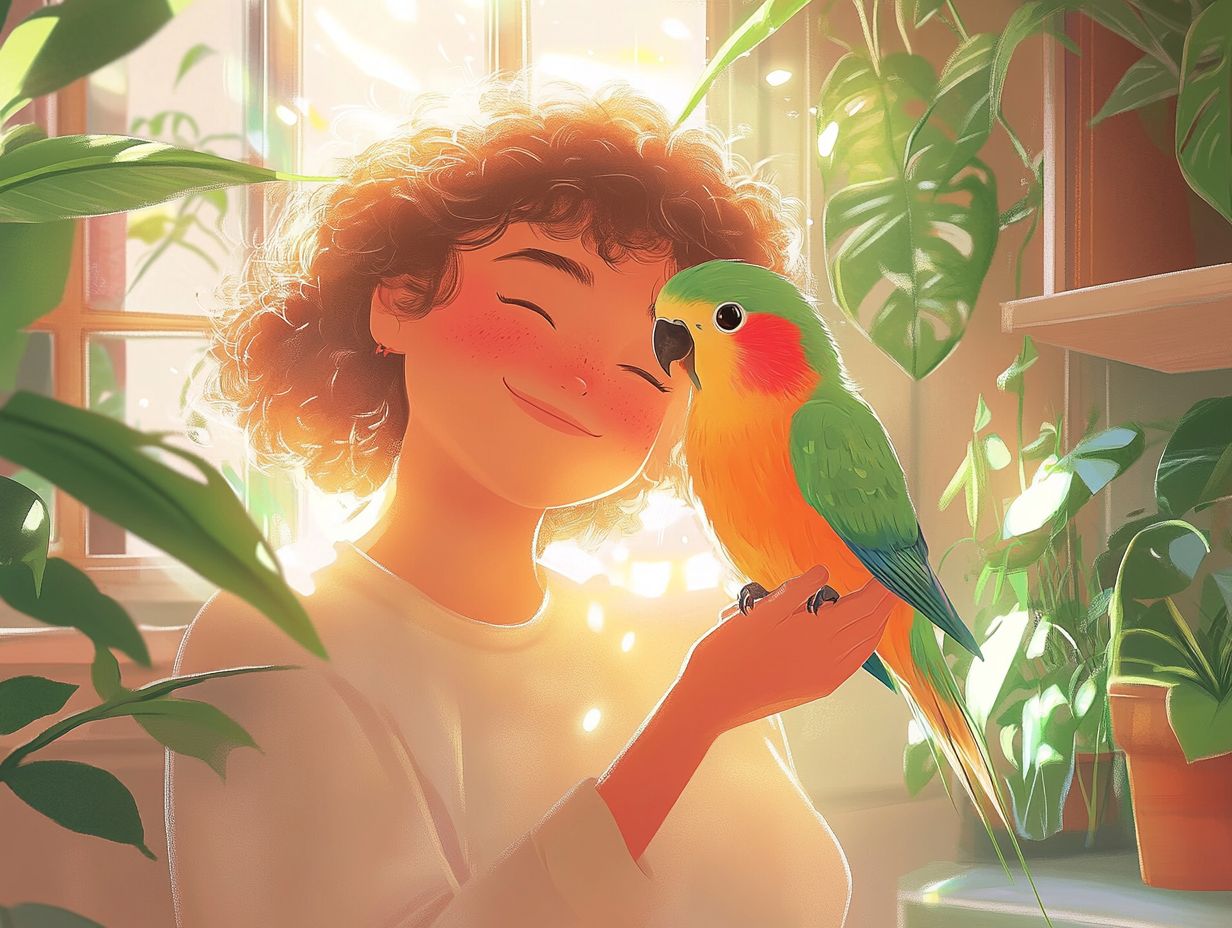
What are the emotions involved in bird adoption?
The emotions involved in bird adoption include excitement and sometimes anxiety or guilt. Adopting a bird is a big commitment, and it’s natural to feel a range of emotions during the process, especially when considering the journey of rescued birds.
How can I prepare emotionally for bird adoption?
Learn about the responsibilities involved in owning a bird and have realistic expectations. Talking to other bird owners or a trusted veterinarian can also be very helpful.
What should I consider before adopting a bird?
Think about your lifestyle, living space, and budget. Birds require daily care and attention, as well as specific housing and dietary needs.
Research the species of bird you are interested in to ensure it s a good fit for you.
How can I cope with the challenges of bird adoption?
The challenges of bird adoption can include behavioral issues, bonding difficulties, and potential health problems. Be patient and seek guidance from experts.
Provide a nurturing and loving environment for your bird.
What emotions may arise during the adjustment period after bird adoption?
The adjustment period after bird adoption may lead to feelings of joy, frustration, and love. To better understand this process, you can explore the history of bird adoption movements. It may take time for your new bird to adjust to their new home.
With patience and understanding, a strong bond can be formed.
How can I ensure a smooth emotional journey for both myself and my new bird?
Keep a positive mindset for a better experience for both you and your new bird. Be patient and provide a supportive and loving environment.
Seeking advice from experienced bird owners and continuing to educate yourself on bird care and behavior can also be beneficial.


